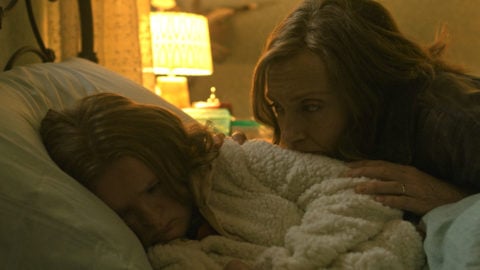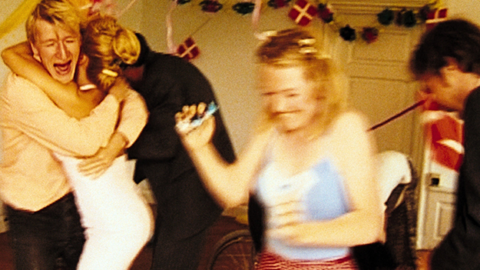Interview: Lars von Trier
The start of my interview with Lars von Trier at Cannes was delayed so that Gaspar Noé could come and pay his respects. Noé, whose own film Climax went on to win top honors in Directors’ Fortnight, was among the admirers of Trier’s The House That Jack Built, freshly premiered out of competition. Matt Dillon stars as a serial killer in this latest film from the 62-year-old Danish director, who again employs ironic narration, chapter divisions, elaborate violence, and bookish digressions; Uma Thurman and Riley Keough are among those playing the victims. Here in the U.S., the movie has already had its requisite tangle with the MPAA, who expressed concern that an unrated sneak preview had created “confusion among parents.”
Meanwhile, back in May at Zentropa Villa—the rented poolside roost for Trier’s production company, a quick taxi ride above Cannes—Noé had walked past me, and I walked in, slightly befuddled after hearing a strange but reassuring story about a scene involving a duckling. Trier was seated at a long wooden table by an open kitchen, extremely sedate and looking avuncular in beard and thin-rimmed spectacles. The House That Jack Built opens December 14; the Film Society of Lincoln Center hosts a Film Comment Talk with Matt Dillon on December 13.
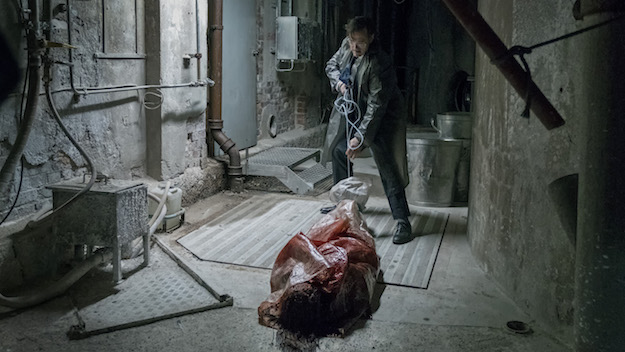
Some were concerned you might miss Cannes this year, or that your film wouldn’t come out until next year or something.
Yeah, I was too, because of this persona non grata thing [i.e., the ban from Cannes after the notorious 2011 press conference for Melancholia]. They really took it seriously. We were about to look for Berlin instead. But that was almost a year away. It’s a good feeling when the film is shown and it’s out there.
So with Matt Dillon, how do you direct someone to be a psychopath, i.e., not have any empathy? I’m curious how that affects talking about a character and his emotions.
I told him to trust me. And it seems he did. The technique we were using is to film a scene in very many different ways. Maybe you were sitting there when you say the first line, then you’re sitting over there… Everything is very loose, and we get the essence of it when we edit.
How many hours of footage did you end up with?
I don’t know.
Was it a lot, relatively?
I think it was about average for what we do. Dogville was a lot of footage. But the good thing is that I’m always close to the camera, and I suggest things. I stop the scene and I suggest, “Maybe you attack it from another angle.”
Were you ever operating the camera?
I haven’t done that for the last two films, but I did when I was younger. Dogville was ridiculous because I also had to carry a microphone and a lamp. The only thing I was missing was a big drum on my front.
A one-man band.
Yeah. We were a hundred people on that crew, and yet nobody was there. Just me and the actors.
But then you get to have a very direct relationship with the actors.
Yeah. [In Dogville] Lauren Bacall always wanted to know something about something—she was in the background a lot of the time, and I had to run there with this enormous camera. And she would say, should I take this tin, or this tin? And I would say, “I don’t give a shit! You’re in the background!” [imitates Bacall’s voice] “Oh, I’m sorry.”
On The House That Jack Built, you’re using a lot of handheld, as you’ve done in other films for various reasons. Why did you do it here?
I think that if you do it handheld, you set the actor free, right? Because otherwise he has to relate to the camera, and the whole idea is that he shouldn’t.
You’ve also worked with creating beautiful composite images, notably in Melancholia (2011) and Antichrist (2009). Did you use that tool much in this film, in any of the hell sequences?
Actually, one of the best shots we did was [to re-create] this Delacroix painting [The Barque of Dante] and that was done without a computer. It was staged in a swimming pool with a big backdrop. It was quite fulfilling to do that in a way where you can actually see what’s happening. I thought it was time again to make some images of hell. There have been a couple of hundred years where it wasn’t so popular.
What were some other ideas for hell that you considered? You start with an almost lo-fi look, like a horror movie, and then it gets grander as you go down deeper.
Yeah. It becomes Lord of the Rings.
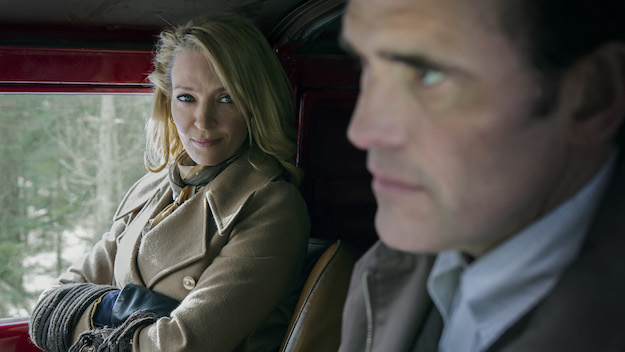
I was reading up on hell a bit. It’s interesting that murder is in the seventh circle, but treachery and fraud are actually deemed worse, the ninth and eighth.
Yeah, it depends a little on how the fashion is.
So at the time of Dante’s Inferno, treachery and fraud were worse than murder?
Oh, absolutely. It’s like under the Russian Revolution, remember, there was the death penalty for stealing bread, because they had so little food. I don’t know, I read The Divine Comedy, but it’s difficult because there are so many names of people you don’t know.
Yeah, you’re constantly looking them all up.
He actually wrote the book because he had all these enemies, and he put them in different places in hell. And then he came to heaven, and it was no fun anymore.
Did you do that, put enemies in your vision of hell?
No, no. It’s not so.
A lot of people were complaining about how brutal and violent the film is, but you do create a sense of morality: Jack is horrible, but he goes to hell.
Yeah.
Was the film always like that?
Yeah. You know, a few years ago I wouldn’t have let him die. But you know, this is a real film where the villain hangs from their nails and falls [as in a cliffhanger]. I just had to try it, and it felt good. I’m not saying I’m going to do it again, but…
Maybe next time the villain will get away.
Yeah.
It’s interesting that you say it felt good. I saw the Ingmar Bergman documentary [Searching for Ingmar Bergman] here, and Bergman at one point refers to art as a form of therapy for the artist. Does it ever make you feel better in that sense?
Well, not so much in its content, but the work helps you with anxiety and stuff. You have to get rid of it and work.
Your movies suggest you feel pretty free as an artist. But expressing yourself doesn’t always help the anxiety.
No, I think it’s the opposite. [Pauses] I think that if you’re afraid of dying within the next 10 minutes then who cares about a film? So you can be very free in your work.
The House That Jack Built poses the idea that Jack’s murder is a bit like art. But maybe the idea is also that art is a bit like killing, because you do violence to form, to the material.
Ah, yeah. But I also have this: my four children are now in their twenties, and they’ve all begun to scream at me for being a really poor father who only made films, and all this that you’re trying to not be. I think it’s a cheap trick from their side, but, of course, they had to pay somehow.
In the Bergman documentary again, someone says you just can’t do them both all the time—art and family.
Bergman had another interview with Erland Josephson, and they both complained about their fathers not being there. And then a woman said, “Have you thought about the fact that you both have children yourself?” They both had something like seven children that they never see. I was asked, after Bergman died, if I had something to say about him, and I said that I always felt like one of his children: I’m proud to say that he treated me in exactly the same way—with no interest whatsoever.
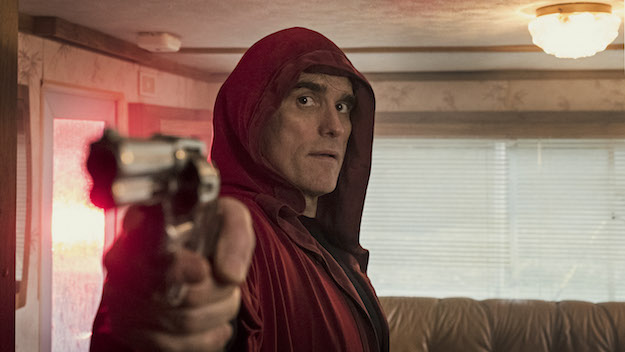
Did your own children watch your movies, growing up?
Yeah, but they didn’t care to, you know. One of my sons has changed his name.
That’s pretty dramatic.
We’re such a dramatic family, believe it or not.
Sometimes I wonder about filmmakers who grew up watching your movies or who were influenced by you. What do you think of Yorgos Lanthimos, for example, have you seen his films?
No. I had this idea that I shouldn’t see modern films.
What are you watching instead?
I’m watching the old ones. I just saw 1900 again. It was on my screen back home, but it’s a fantastic film. It’s really strange what happens with Bertolucci, because he was such a master. Last Tango in Paris—fantastic film.
What do you like about it?
It was very clean, and it was a scoop to have Marlon Brando and Maria Schneider. She did three films [that] were all masterpieces.
Who would you like to work with now that would be a real scoop for you?
I’d still like to take in somebody I’ve worked with before, because it’s family—they become family. Björk didn’t become family. So I doubt you will see Björk again.
Other actresses you’ve worked with say that you understood them well.
Those are big words, but… I took the time. I couldn’t work if we weren’t on good terms. I had to with Björk, but with Björk it was actually a very successful collaboration, only we hated each other. But as soon as it came to shooting something, she changed, and it became very good, I think.
What made you want Matt Dillon as Jack?
We tried a lot of people, and it was really difficult to cast. They would do anything to film with me, but not the script.
Can I ask who?
People I respect. But then Matt was suggested to me, and I remembered him because he hasn’t been visible for some years. And then I found out he was cast by the guy who cast The Godfather, and so I thought, there must be something here.
[Publicist enters to wrap up the interview and says, “We’re trying to get through things.”]
Through life? We’re trying to get through life?
Since you have some fun in this film pushing boundaries, I’m curious to know what you think is still taboo.
Well, there are, of course, certain rules. Censorship is coming back. Half of my films can’t be shown in France now. And that’s surprising.
Is that since the Nazi comments?
It’s because after being attacked by the Muslim world, they put in a religious committee to see the films, which is, for me, a step back and unexpected. But everything seems to be quite negative—the right-wing turn everywhere, Trump. When you saw him the first time, you’d say he’s a clown, and then suddenly he’s [the President]. And you can’t say when he lied, because he lies all the time. That’s quite clever, actually.
Yeah, or terrifying.
It is terrifying because if we end up with Trumps all over, because of democracy, then what alternative is there?
Nicolas Rapold is the editor-in-chief of Film Comment and hosts The Film Comment Podcast.



